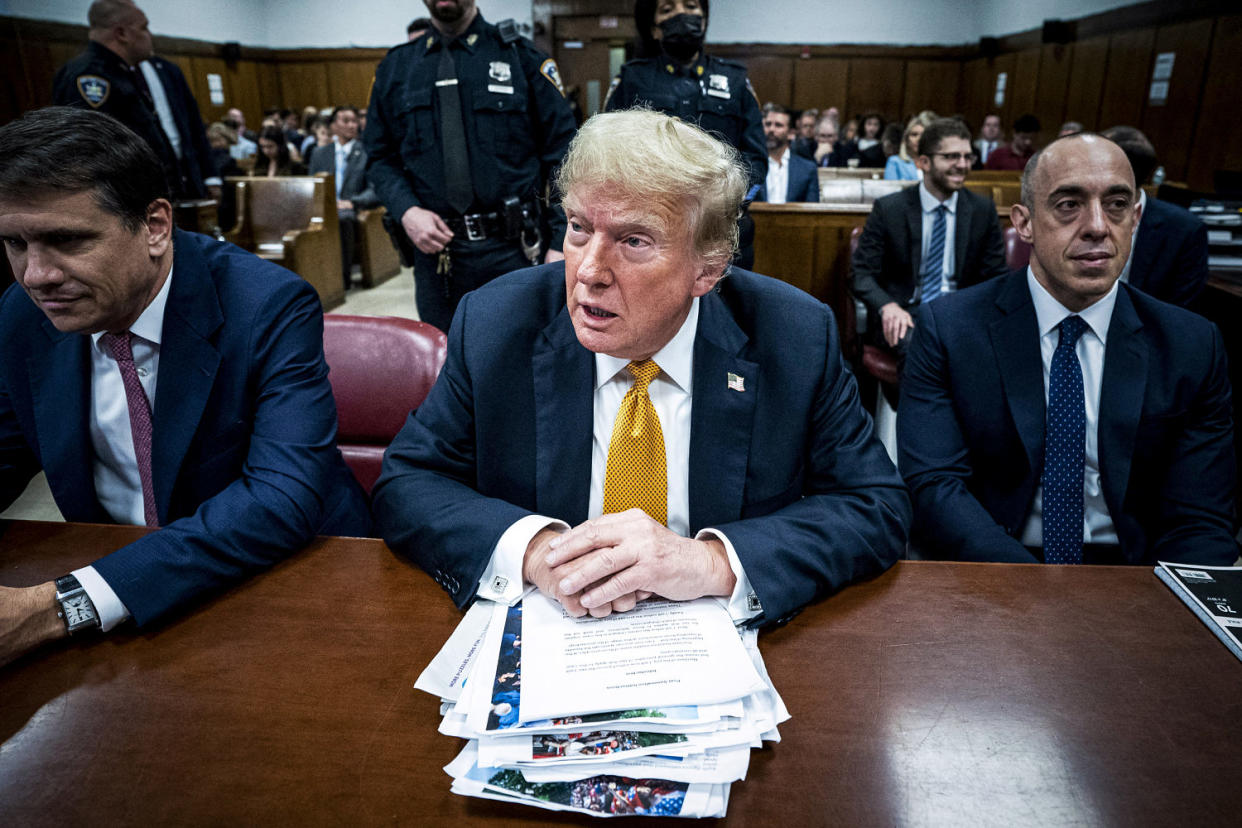The question looming over the Trump trial jury: From the Politics Desk

Welcome to the online version of From the Politics Desk, an evening newsletter that brings you the NBC News Politics team’s latest reporting and analysis from the campaign trail, the White House and Capitol Hill.
In today’s edition, senior national politics reporter Jonathan Allen looks at how the burden of reasonable doubt hangs over jurors in Donald Trump's New York hush money trial. Plus, senior politics editor Scott Bland explores how congressional primaries have grown more competitive in recent years.
Sign up to receive this newsletter in your inbox every weekday here.
Trump trial jury must now decide if prosecutors left any room for doubt in ‘mountain’ of evidence
By Jonathan Allen
It’s easy to watch former President Donald Trump’s New York trial and conclude that he probably did exactly what prosecutors allege: protect his 2016 campaign by paying off a porn star and then cover it up with phony payment records.
Michael Cohen, the former president’s onetime fixer, testified that he was the tool Trump used.
But “probably” isn’t the bar for jurors. They are charged with evaluating whether there’s any reasonable doubt. Just one of them can hang the jury if he or she believes the state failed to meet that burden.
Do you have a news tip? Let us know
The question then, as they began to consider the evidence over 4½ hours Wednesday, is whether the witnesses and documents presented by the prosecution leave any room to doubt Trump’s criminal culpability.
Like any veteran prosecutor, Joshua Steinglass told the jurors Tuesday that they had seen a “mountain” of evidence of the 34 alleged crimes.
Trump himself tweeted in 2018 that he had reimbursed Cohen for the hush money payment. It’s a contention that Cohen bolstered by testifying that a year’s worth of $35,000-per-month payments to him from Trump’s personal trust were that reimbursement — not the “legal retainer” described in Trump’s business records — along with a plus-up to cover taxes and money for a separate deal with a tech company.
Trump’s lawyers argue that the records are true and that Cohen — who did little legal work — was, in fact, paid more than $400,000 in a year to be on call as a lawyer.
They say Trump had nothing to do with Cohen’s invoices or corporate vouchers involved in approving the monthly payments. Trump’s signature on checks, they contend, isn’t evidence that he knew what he was paying for.
The room for interpretation about the nature of the payments may be limited by Trump’s tweet, which said Cohen was reimbursed through a retainer. Trump also described the reimbursement in a filing with the Office of Government Ethics during his presidency.
Trump’s lawyers, led by Todd Blanche, have argued that Cohen went rogue in negotiating a deal to buy porn actor Stormy Daniels’ silence — essentially that Trump didn’t know about it. No one has suggested that Trump and Daniels didn’t meet in a hotel room in 2006. Trump has denied Daniels’ allegation that they had sex. But that matters less than whether — or why — he wanted to stop her from making her claim publicly.
Members of Congress are still tough to beat in primaries — but they’re feeling the pressure
By Scott Bland
The Republican establishment notched a win Tuesday night in West Texas, where GOP Rep. Tony Gonzales narrowly beat a right-wing primary challenger, Brandon Herrera, in a runoff.
Groups like the House GOP leadership-aligned American Action Network poured in big money to help Gonzales, ultimately helping protect an incumbent who has voted to pass key legislation against a potential rabble-rouser. That matters a lot in a slim House majority. But the whole episode also illustrates how much more pressure rank-and-file House members are feeling in Republican primaries these days compared with the recent past — and how that affects legislative action in Congress.
Members of Congress don’t lose primaries very often, but they’re getting pulled into competitive races much more frequently in the last decade or so than before. More than three-quarters of them regularly won their primaries unopposed or with 90-plus percent of the vote from 2000 through 2008.
But there’s a sharp dip after the Great Recession, driven largely by anti-incumbent action on the Republican side during the tea party and pre-Trump era.
The floor for anti-incumbent challengers, which previously had been essentially 0%, suddenly rose. That means more attention on protecting the flanks and avoiding votes or issues that might anger the primary-voting base. Gonzales’ apostasies in Texas included voting for a bipartisan gun law in the wake of the 2022 school shooting in Uvalde, which is in his district. It’s no stretch to say legislation like that has gotten rarer and rarer because fellow members see the tough races that incumbents like Gonzales attract after such votes, even if he won in the end.
Notably, Democrats had their own dip in super-safe incumbent primaries in 2020. We’re still working on gathering the data from 2022, but it’ll be very interesting to see whether that was a blip or the start of a new trend in a Washington that’s as attuned as ever to the power of primary voters.
That’s all from The Politics Desk for now. If you have feedback — likes or dislikes — email us at politicsnewsletter@nbcuni.com
And if you’re a fan, please share with everyone and anyone. They can sign up here.
